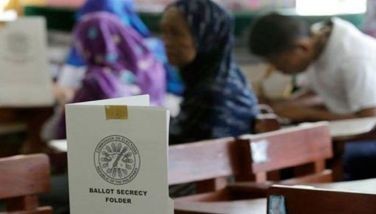Blind Chinese activist fights for the ‘little man’
Blind activist Chen Guangcheng listened intently to the harrowing stories of women forced to abort their babies in the late stages of pregnancy in a rural village in
Although Chen couldn’t see their tears, he could hear their anguished cries and vowed to take action against the responsible local officials.
In a few weeks, Chen gathered testimonies from victims of population control abuses and worked closely with them and some lawyers in organizing a class suit against the abusive officials.
The case was considered the first concerted domestic challenge to the use of violence in enforcing
It also inspired Chen in his advocacy to bring the plight of thousands of Chinese villagers to the media and the international community.
Faced with widespread protests, the Chinese government adopted a law granting citizens the right to make an “informed choice” and rewarding couples with only one child and penalizing those with two or more children. Unfortunately, many local officials continued to practice forced abortion and sterilization.
By challenging the Communist Party’s one-child policy, Chen paid a high price. Thugs routinely went to his house and beat him up. Chen’s computer was seized and his cell phone was jammed. He was held for months under house arrest and then charged with disturbing public order in connection with a rally held by his supporters.
He was convicted in a closed-door trial from which his own lawyers were barred. He is now serving a four-year prison sentence.
Chen is this year’s Ramon Magsaysay awardee for Emergent Leadership. The awards program, the Asian counterpart of the Nobel awards, cited Chen’s “irrepressible passion for justice in leading ordinary Chinese citizens to assert their legitimate rights.”
Although in jail, Chen is optimistic that his quest for justice will bear more fruit. But he believes people must also learn how to assert and protect their rights.
Blind infant
Chen, who hails from
He was not able to go to school because of his disability but he took pains to gain knowledge through listening to the radio and classic Chinese stories his father read to him as a child. At 17, he entered a school for the blind and by 30 he finished a university course in massage and acupuncture therapy. It was at this age when Chen first got involved in activism.
In 1996, when local officials refused to honor a law exempting disabled persons from the annual agricultural tax – imposing an additional burden on his own disabled parents – Chen protested and took his complaint to central authorities in Beijing and won the case.
Lacking formal legal training, Chen built up his knowledge of the law by making friends read legal books to him so he could document complaints and file cases in local courts.
In 1998, Chen led farmers in Yinan country in protesting the operation of a river-polluting paper factory and even persuaded an international donor to fund the digging of a deep well for the community.
Chen then established a center for protecting the rights of the disabled and filed a case against a public transportation company in
By this time, Chen’s activism was infuriating local authorities who subjected him to harassment. Posters even appeared in
Awardees arrive
Some of the 2007 Ramon Magsaysay awardees have started to arrive for the awards ceremonies on Aug. 31.
Rev. Kim Sun-tae, this year’s awardee for Public Service, arrived yesterday on a Korean Airlines flight.
President Carmencita T. Abella of the Ramon Magsaysay Award Foundation, which administers
Other laureates who are set to arrive over the weekend are Mahabir Pun (Community Leadership) from Nepal, Palagummi Sainath (Journalism, Literature, and Creative Communication Arts) from India, and Tang Xiyang (Peace and International Understanding) and Chung To (Emergent Leadership), both from China.
They will join Filipino awardee for Government Service, former senator Jovito Salonga. The other awardee for Emergent Leadership, Chen Guangcheng, will be unable to come to
- Latest
- Trending

































